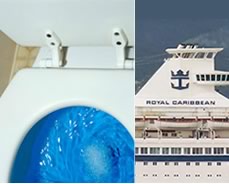
| EVENTS AND RALLIES read more » |
||
|
News |
||
| FAQ's read more» |
||
OCEANA URGES PASSAGE OF THE CLEAN CRUISE SHIP ACT OF 2004
Pollution from cruise ships is a growing problem. Cruise ships generate an astonishing amount of pollution, up to 25,000 gallons of sewage from toilets and 140,000 gallons of sewage from sinks, galleys and showers each day. Currently, lax state and federal anti-pollution laws allow cruise ships to dump untreated and inadequately treated sewage from toilets in state waters. This puts our coastal environment at risk from the threats of bacteria, pathogens and heavy metals generated in these waste streams.
Therefore, Oceana is supporting federal legislation to bring cleaner cruising standards to the entire industry.
The Clean Cruise Ship Act of 2004, introduced in Congress by Senator Richard Durbin of Illinois and Congressman Sam Farr of California, will do just that. It will:
- Prohibit discharges of any sewage or bilge water within 12 miles of U.S. shore and within the Great Lakes.
- Establish uniform treatment standards for sewage discharges outside of 12 miles.
- Ensure illegal discharges do not continue by requiring better inspection and monitoring.
- And more!
TAKE ACTION
If you'd like to see these standards brought to the cruise industry, you can help the Clean Cruise Ship Act make its way through Congress. Contact your Member of Congress and Senators and ask them to co-sponsor the Clean Cruise Ship Act of 2004 (S.2271 in the Senate, H.R.4101 in the House) -- the more co-sponsors the bill has, the better chance it has of passing.RECENT VICTORY!
Royal Caribbean has committed to install advanced wastewater treatment equipment on its entire fleet, showing that all cruise ships can help protect our oceans. And while Royal Caribbean's decision is laudable, it is not a complete solution to the problem of cruise pollution. If Royal Caribbean can do it, the other cruise companies can do it, too! View the press release.More information:
- Clean Cruise Ship Act of 2004 Fact Sheet
- Play the "Cruise and Lose" game (requires Flash Player)
Who is Oceana | Contact Us | Privacy Policy | Site Map | Donate